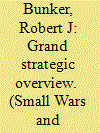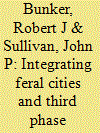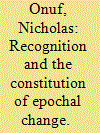| Srl | Item |
| 1 |
ID:
108342


|
|
|
|
|
| Publication |
2011.
|
| Summary/Abstract |
This grand strategic overview highlights and analyzes the influence of epochal change on the state and conflict and the new realities with which the United States must now contend. This deep context is being provided so that (1) the belligerent and politicized non-state entities that have emerged in Mexico and the Americas can be better understood within the larger three-front grand strategic temporal conflict the US is now engaged in; and (2) the stark realities that the US faces - such as loss of unilateral world dominance, increasing debt and ongoing deficits, shifting demographics, inability to staunch the flow of and demand for illicit drugs, and an increasing prison population - are highlighted. Finally, this essay finishes with a discussion of the many important contributions contained in this edited work.
|
|
|
|
|
|
|
|
|
|
|
|
|
|
|
|
| 2 |
ID:
108344


|
|
|
|
|
| Publication |
2011.
|
| Summary/Abstract |
This essay addresses and integrates 'feral cities' with 'third phase cartel' and 'third generation gangs' (3GEN Gangs) research. The feral cities diagnostic tool will be expanded from three levels (green, yellow, and red) to five (adding purple and black). This will be accomplished by means of the addition of two new levels that model the shift from ferality (de-institutionalization) to criminal re-institutionalization of urban social and political structures around new patterns of living. Such processes set the stage for the projected emergence of the BlackFor (Black Force) within the Americas. BlackFor represents a confederation of illicit non-state actors - essentially a postmodern form of societal cancer - linked together by means of a network of criminalized and criminal (narco) cities as are now arising.
|
|
|
|
|
|
|
|
|
|
|
|
|
|
|
|
| 3 |
ID:
121856


|
|
|
|
|
| Publication |
2013.
|
| Summary/Abstract |
For two decades, political theorists have granted recognition a great deal of attention. However, theorists of international relations have not, despite a common interest in identity politics. Instead, the latter take recognition for granted as a long-standing practice enabling states to engage in relations, as equals, under law. I hold that recognition is an unexplored way of addressing the constitution of epochal change in the modern world. I develop this claim first by reviewing what political theorists say about recognition. Not sharing their preoccupation with identity, I also draw on a secondary but still important theme in this literature - recognition's relation to justice. I then turn to the relations of states to show how international society has always exemplified the very processes of recognition that political theorists would like to find within their late modern societies. I conclude with some comments on the enduring properties of international society.
|
|
|
|
|
|
|
|
|
|
|
|
|
|
|
|